Products You May Like
That there are more than 100 entire PC games is a revelation as shocking as it is disturbing, but despite recently spending days translating Horace’s sonorous yawps into the list that eventually became our RPS 100, a chill silence recently befell the treehouse when we realised that some of our personal favourites had somehow been excluded. Determined to right this most heinous of wrongs, and armed with the conviction that no subjectivity be allowed to exist on the internet without at least one supplementary article of caveats, we’ve all put forth a single game that absolutely should have made the list. Consider the matter closed, then, at least until we all realise we’d actually like to do a 102nd pick each.
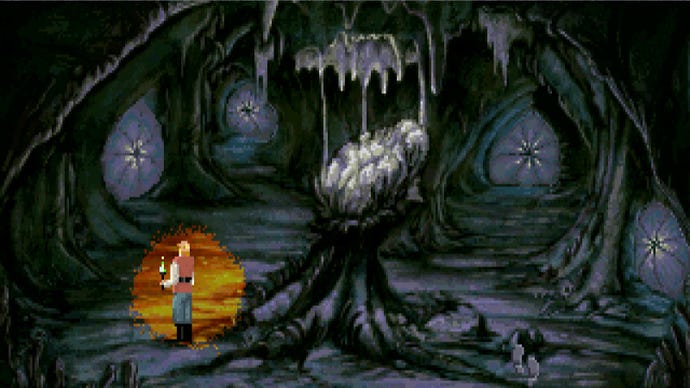
Quest for Glory IV: Shadows of Darkness
Jeremy: The Secret of Monkey Island was the only classic point and click adventure game that made it onto the top 100, since there is probably LucasArts bias deep within the halls of RPS. I, however, was a Sierra kid growing up, and there was no Sierra series that moved me more than Quest for Glory. There also hasn’t been a franchise similar to Lori and Corey Cole’s mashup of adventure game mechanics and RPG stats ever since the ‘90s, and the fourth entry, 1993’s Shadows of Darkness, is the best.
You play as the nameless hero, navigating the Eastern European-inspired valley of Mordavia. The overall quest is about saving the land from vampires who want to summon Avoozl, a not-so-subtle reference to Cthulhu, but what stands out the most is the sheer sense of melancholy that infuses this game’s side plots. Every NPC in the valley is suffering from some sort of sadness, from the innkeeper whose daughter has been kidnapped to the lead vampire herself. And as the hero, the sense of accomplishment you get from helping them solve their problems and bring a little bit of light through Mordavia’s eerie treetops is a sense of accomplishment that’s rarely been equaled in gaming for me.
All of this is combined in a great package with a combat system inspired by Street Fighter II and expert voice narration with John Rhys-Davies acting as the narrator. Alas, Shadows of Darkness was also buggy as hell when it was first released – to the point that it nearly killed the series – but fan patches have since rectified this. Go and play it alongside the other Quest for Glory games on Steam, which sell for a negligible eight pounds these days.
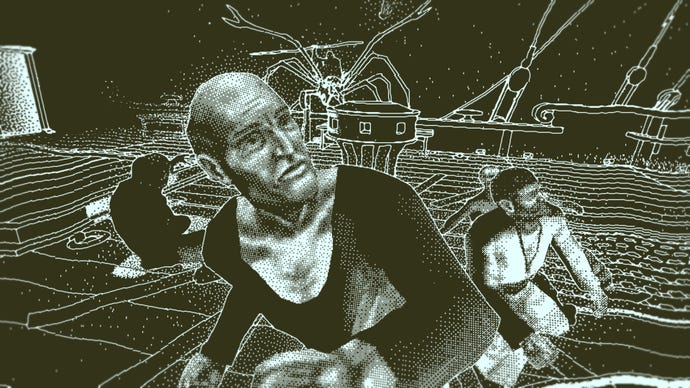
Return Of The Obra Dinn
Brendan: Few games put you in the shoes of an insurance man circa 1807. Fewer still manage to make his job a compelling investigation into the deaths and disappearances of 60 people. Obra Dinn sees you clambering aboard a ship of the same name, recovered intact but with none of the crew remaining. Using a magical stopwatch, you revisit moments frozen in time and log the details of each and every death. It is not just a 60-person whodunnit, but a howdunnit, wheredunnit, whendunnit, and whydunnit.
Across four decks of the ship you slowly piece together the exact fate of the crew, and eventually realise how avoidable many of the deaths might have been. But also, how a few seemingly straightforward deaths spark a cascade of tragedy that engulfs everything, often in some surprisingly mythical ways. It’s an act of social archaeology as much as a murder mystery, a dithered Macintosh equivalent of the Rime of the Ancient Mariner, and it grips you from the first arcane swirl of that mysterious watch.
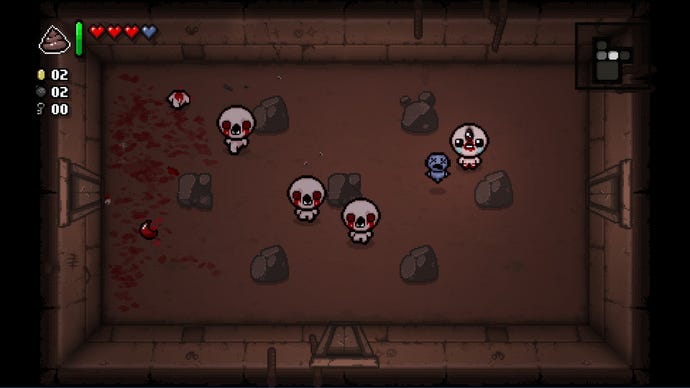
The Binding Of Isaac: Rebirth
Ed: One of the early roguelikes that’s stood the test of time, BOI makes the whole randomly generated moving through rooms schtick a real doozy. Maybe doozy is the wrong word, considering the theme of this game is bloody and foetal and smeared in faeces. But you sort of get what I mean right? It’s simple: you control Isaac (and later unlockable weens) who sprays his tears at nasties in rooms. You survive for as long as you can, delving deeper and deeper into his Mum’s basement.
One thing I really love about BOI is its frightening replayability. I’ve sunk 112 hours (light work for a number of you, I’m sure) into it and I’ve barely unlocked all the weird items that augment your Isaac into a monstrosity that shoots blood from his eyeholes or has a fat sprog circling him like a kevlar cabbage patch kid. One of my friends has nearly 1000 hours on it and he’s still chasing certain achievements on the daily. And it’s now got online co-op, so I’ll inevitably join him on this crazed hunt for a silly little square he can show off on his profile.

Into The Breach
Graham: Into The Breach is perhaps the best turn-based tactics game ever made. Controlling small squads of mechs, it’s your job to defend cities from invading aliens. What makes it accessible and rewarding is that the aliens telegraph their next move, giving you perfect knowledge of the single-screen, 8×8 battlefield, and with it the opportunity to determine the perfect counter-move. The move which attacks, shoves and defends just-so, and causes the enemy to do no damage except to themselves.
Into The Breach felt like a response to the hit percentages of XCOM: Enemy Unknown (which made the list), and in turn feels like it has influenced a further generation of turn-based tactics such as XCOM: Chimera Squad and Tactical Breach Wizards (the latter of which made the list). Into The Breach might remain the best of all of them, and I find it painful that it didn’t make the top 100. Doubly so when you consider we also dropped FTL: Faster Than Light. Subset Games, we have failed you.
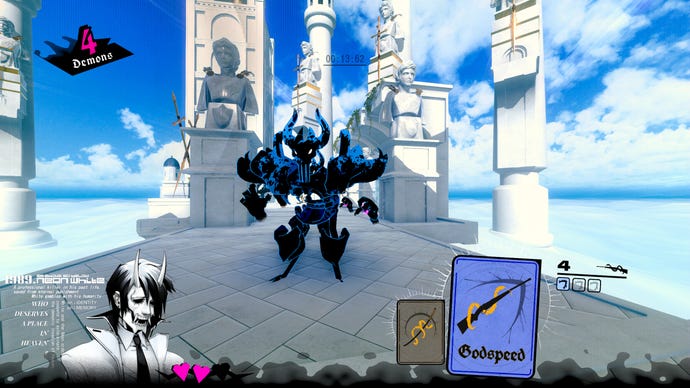
Neon White
Nic: Writing about Sekiro for the Big List, I mentioned that its flowing levels and encounters feel deliberately designed to impart the joys of speedrunning, so it would be criminal of me not to highlight the one game that does that better than any other. Neon White is the game you play after binging SQDQ and needing to feel the same effortless skill through traversal of digital space you’ve mapped into instinctual mastery. It’s also the game that stops you going outside again that summer.
It achieves this sense of simulated mastery by effectively offering you curated FPS rollercoaster rides, where the levels both teach how to speedrun with intended routes while giving you increasingly more leeway to experiment as you progress. The feeling is pure controlled vertigo. It may not have made the top 100, but it gets my personal award for the most videogame-ass videogame of the decade.
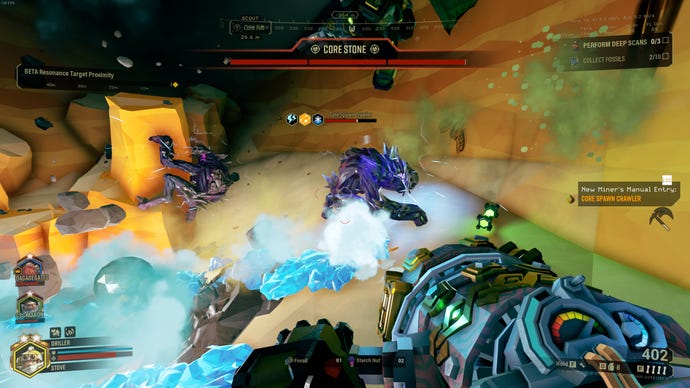
Deep Rock Galactic
James: Who’d have thought that Left 4 Dead’s successor as the co-op FPS par excellence would come out of a little Danish studio, let alone star a quartet of sloshed, deep-space dwarven miners? Deep Rock Galactic nails the basics, with its theatrical armoury and satisfyingly squishy hordes of bugzoids, then masters the interplay that gives truly great 4-person shooters such long legs. I love zipping around as a shotgun-jumping Scout, but I’m only half a class without an Engineer to lay down the platforms I need for high-altitude mineral mining. And while its alien caves are purely proc-gen, it consistently pumps out terrain that’s both visually impressive and rich in interesting navigational challenges – hence the importance of bringing a Driller who can carve out the rock to create new paths, or a Gunner to zipline the crew across chasms.
Banding together to conquer these deathpits and bag their jewels is as gratifying as blasting any bug, and even if not everything goes to plan, a generous unlimited-revives policy means that failure is only an option if everyone goes down at once. That, in turn, leaves the wiggle room for individual dwarf mishaps to remain as pure comedy, and it is indeed hard not to smile when an overeager Scout gets caught in a C4 blast. Or when an Engineer misjudges a platform jump and faceplants the rock below. Deep Rock Galactic is funny, and light, in ways that most co-op games either actively reject or attempt to force through naff banter. And without having the option to down pints at the space-tavern after a mission.
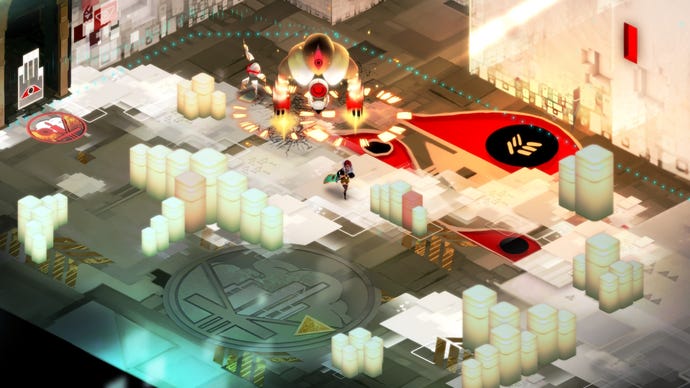
Transistor
Ollie: If we all had core memory spheres like in Inside Out but purely for games, then one gorgeous swirling marble of white and red inside my head would be my first playthrough of Transistor. Still Supergiant’s hardest-hitting story, Transistor takes 3-4 hours to play through and then stays with you for years. It’s a quiet, sombre tale of love and survival between a singer who’s lost her voice and her companion, trapped inside a device that’s part giant sword, part USB stick. All of which takes place in a stunningly realised digital heterotopia which dripfeeds lore with a quality only matched by FromSoftware. I wrote my undergraduate dissertation on this game, for pete’s sake.
Transistor is a marvel, and as much a joy to play now as it was in 2014. The curious blend of real-time and turn-based combat is odd but compelling, and the wonderful recursive functions system where you can place abilities inside abilities to give them new effects is something I wish more games would have the courage to try. It’s beautiful, and sad, and joyous, and playful, just like its masterpiece of a soundtrack. Along with Pyre, Transistor might be Supergiant’s most divisive game – but for me it’s probably still their most important.

Ghost of Tsushima
Kiera: In the impatient few years we were all clamouring for an Assassin’s Creed set in feudal Japan, Ghost of Tsushima came along and stole the show. You play as Jin Sakai, a samurai who must defend his people against the invading Mongol empire. Jin is constantly torn between keeping to the ‘old ways’ of honourable duels or adopting the more underhand but arguably more effective stealth tactics, the ‘way of the Ghost’.
The cinematic scenes and colour palette of this game are simply a work of art and the island of Tsushima is so atmospheric that it’s worth the price tag based on this alone. If you want to catch a break from the main storyline, you can supplement your time by writing poetry, discovering Shinto Shrines, Inari Shrines (with a cute little fox spirit to guide your way) and following the direction of the wind to your destinations. There are also hot springs you can visit to ogle at Jin’s ample booty…and for the increase in health, of course.
The combat allows you to perform combos which change depending on your samurai ‘stance’. I quickly unlocked an ability that I rinsed to death which allowed me to challenge an opponent and then cut through up to 5 enemies at once in just a few swipes. It’s so satisfying and gruesome. This is one of the best games I’ve played in the past few years and definitely deserves some recognition, particularly if you’re interested in the lore and histories of Japan (and don’t mind a little dramatisation in the process).
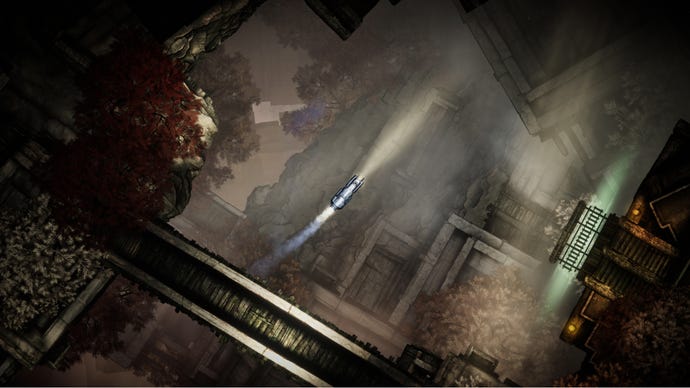
Sunless Skies
Edwin: There’s a bit in Sunless Skies where you’re chuffing merrily across a vast, astral ice-sheet and you realise that there is Something inside it, a fat coil of darkness that seems to stir in the glare of your locomotive. “How deeply do the dead sleep?” the game asks. “Fly softly”. Moments like these are the highlights of Failbetter’s alt-Victorian space sim, as far as I’m concerned. The lowlights, rather.
Instead of open void, it gives you a universe of layers, dragging the eye down from the smoking filigrees of ports and settlements to shadowy ruins and a horrible, ocean-floor sediment of myth – murdered suns, frozen wormholes, heavenly beehives. Your space train trundles over the surface like a pond skater braving a lake of pike. Your crew have the luxury of shutting the portholes, but as captain, you have no choice but to look. Masterful stuff. The previous Sunless Sea provoked similar unblinking unease, but Sunless Skies is where the art and technology really come together. It’s the only space game I’ve ever played that triggers my thalassophobia.
It’s also an absurd bounty of great writing, exploring various kinds of literary fantasy that together form a complicated accounting of the British Empire. Each realm, each location and each winding sidestory is a baroque peculiarity that both stands apart from and sheds light upon the whole. In the skies of Albion, time itself is smelted in factories by rapidly ageing labourers. In the Reach, there are nebulous oakwoods and cosmic winds that cause your food supplies to sprout. You can take on many, many quests, but really, the only objective here is to travel around and marvel at it all – once you’ve mastered the art of keeping your crew healthy, fed and sane, at least. The last part is easier in Sunless Skies than in Sunless Sea, but this remains a gruelling experience. Absolutely worth the trouble though. If you like lush words, weird places and pervasive creepiness, there’s no game like Sunless Skies.
Nic: I’ve heard it said that the internet is driven by rage, which I’m inclined to disbelieve simply because the RPS commentariat are such a standup gaggle of A+ humans. Except that one guy, obviously. However, I will never pass up a good opportunity to shamelessly appeal to the algorithm. So what about you, dear readers? Which single game are you MOST ANGRY at us for not including? Say it with your whole chest, and at least one of your lungs.
_HX6uSi5.jpg?width=1200&height=630&fit=crop&enable=upscale&auto=webp)